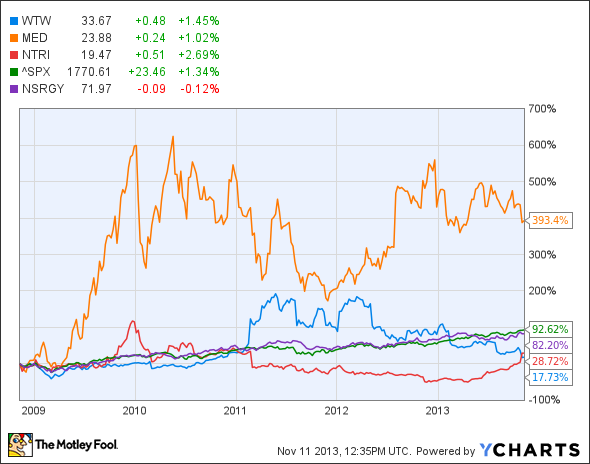You Won't Fatten Your Portfolio With Weight-Loss Centers
Having supported the efforts to ban super-sized sodas in New York City, weight-loss operators like Weight Watchers and Nutrisystem are undoubtedly backing the FDA's decision to go all Mayor Bloomberg on trans fats, too.
The city's "nanny mayor" has waged an all-out war on unhealthy eating. While his ham-handed measures haven't always survived challenges in court -- the soda ban, for example, was overturned -- national governments apparently like what they've seen and are following the trail he blazed. Results have varied.

Source: Jenny Craig.
Mexico just imposed new taxes on soda in a bid to reduce obesity in the country. Denmark tried taxing both sugary drinks and trans fats, but quickly determined it had made an economic mistake and abandoned the effort after only a year.
Undeterred, the Food and Drug Administration last week made an initial ruling toward cutting out trans fats from the U.S. food supply.
The weight-loss industry, in the midst of a funk, needs all the help it can get to help dieters shed pounds.
According to the market researchers at Marketdata Enterprises, the total U.S. weight-loss market grew just 1.7% last year, with revenue rising to $61.6 billion from $60.6 billion the year before, and is expected to grow 2.6% this year. The biggest diet centers themselves experienced no growth in sales in 2012 and are expected to see growth about only equal to the industry as a whole through 2016.
Of the four major players in the market, only Medifast enjoyed any real growth last year, while Weight Watchers and Nutrisystem recorded negligible gains. Jenny Craig actually suffered a decline, which contributed largely to Nestle's decision to sell the weight-loss company to private equity firm North Castle Partners, which also owns the woman's diet and fitness center Curves. Analysts estimate Jenny Craig's current-year sales are roughly $329 million, an anemic performance that's been undermining the value of its parent for years.
In the chart above, we can see that other than Medifast, the weight-loss operators have underperformed the market as a whole. While Weight Watchers recently raised its guidance for the full year (after having lowered it earlier this year), it's still well below what analysts originally had expected from the company. Medifast reported results last week that saw sales fall 5% as its direct channel tumbled 19% year over year, causing it to lower the top end of its earnings guidance to $1.70-$1.75 per share compared to its prior forecast of $1.70-$1.80 per share.
Nestle's decision to exit the business indicates there's little hope for fat profits in weight loss. With a plethora of alternatives to going to a class -- Marketdata analysts say the share of dieters preferring self-directed programs such as websites, apps, and diet books reached 82% during 2012, the highest level ever (I found the paleo diet through a book and it's done wonders for me) -- center operators are going to be hard-pressed to record additional growth.
Obesity continues to grow in the U.S., even if Mexico has surpassed us as the fattest country in the world. But despite some well-intentioned efforts (and some less so) by lawmakers to forcibly change dietary habits, which have boosted the industry, it seems Nestle was right to see its participation in the weight-loss world as one of the things weighing down its operations. Investors might do well similarly cutting out any weight-loss operators from their portfolio.
Where can you find healthy opportunities?
Obamacare seems complex, but it doesn't have to be. In only minutes, you can learn the critical facts you need to know in a special free report called "Everything You Need to Know About Obamacare." But don't hesitate, because it's not often that we release a FREE guide containing this much information and money-making advice. Please click here to access your free copy.
The article You Won't Fatten Your Portfolio With Weight-Loss Centers originally appeared on Fool.com.
Fool contributor Rich Duprey has no position in any stocks mentioned. The Motley Fool owns shares of Weight Watchers International. Try any of our Foolish newsletter services free for 30 days. We Fools may not all hold the same opinions, but we all believe that considering a diverse range of insights makes us better investors. The Motley Fool has a disclosure policy.
Copyright © 1995 - 2013 The Motley Fool, LLC. All rights reserved. The Motley Fool has a disclosure policy.


